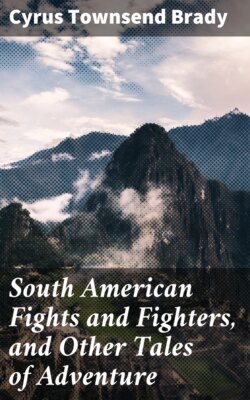Читать книгу South American Fights and Fighters, and Other Tales of Adventure - Cyrus Townsend Brady - Страница 13
На сайте Литреса книга снята с продажи.
IV. Enter One Vasco Nuñez de Balboa
ОглавлениеTable of Contents
Encisco, coasting along the shore with a large ship, carrying reënforcements and loaded with provisions for the party, easily followed the course of Ojeda's wanderings, and finally ran across the final remnants of his expedition in the harbor of Cartagena. The remnant was crowded into a single small, unseaworthy brigantine under the command of Francisco Pizarro.
Pizarro had scrupulously kept faith with Ojeda. He had done more. He had waited fifty days, and then, finding that the two brigantines left to him were not large enough to contain his whole party, by mutual agreement of the survivors clung to the death-laden spot until a sufficient number had been killed or had died to enable them to get away in the two ships. They did not have to wait long, for death was busy, and a few weeks after the expiration of the appointed time they were all on board.
There is something terrific to the imagination in the thought of that body of men sitting down and grimly waiting until enough of them should die to enable the rest to get away! What must have been the emotions that filled their breasts as the days dragged on? No one knew whether the result of the delay would enable him to leave, or cause his bones to rot on the shore. Cruel, fierce, implacable as were these Spaniards, there is something Homeric about them in such crises as these.
That was not the end of their misfortunes, for one of the two brigantines was capsized. The old chroniclers say that the boat was struck by a great fish. That is a fish story, which, like most fish stories, it is difficult to credit. At any rate, sink it did, with all on board, and Pizarro and about thirty men were all that were left of the gallant three hundred who had followed the doughty Ojeda in the first attempt to colonize South America.
Encisco was for hanging them at once, believing that they had murdered and deserted Ojeda, but they were able to convince him at last of the strict legality of their proceedings. Taking command of the expedition himself, as being next in rank to Ojeda, the Bachelor led them back to San Sebastian. Unfortunately, before the unloading of his ship could be begun, she struck a rock and was lost; and the last state of the men, therefore, was as bad as the first.
Among the men who had come with Encisco was a certain Vasco Nuñez, commonly called Balboa. He had been with Bastidas and La Cosa on their voyage to the Isthmus nine years before. The voyage had been a profitable one and Balboa had made money out of it. He had lost all his money, however, and had eked out a scanty living on a farm at Hispaniola, which he had been unable to leave because he was in debt to everybody. The authorities were very strict in searching every vessel that cleared from Santo Domingo, for absconders. The search was usually conducted after the vessel had got to sea, too!
Balboa caused himself to be conveyed aboard the ship in a provision cask. No one suspected anything, and when the officers of the boat had withdrawn from the ship and Hispaniola was well down astern, he came forth. Encisco, who was a pettifogger of the most pronounced type, would have dealt harshly with him, but there was nothing to do after all. Balboa could not be sent back, and besides, he was considered a very valuable reënforcement on account of his known experience and courage.
It was he who now came to the rescue of the wretched colonists at San Sebastian by telling them that across the Gulf of Darien there was an Indian tribe with many villages and much gold. Furthermore, these Indians, unfortunately for them, were not acquainted with the use of poisoned arrows. Balboa urged them to go there. His suggestion was received with cheers. The brigantines, and such other vessels as they could construct quickly, were got ready and the whole party took advantage of the favorable season to cross the Gulf of Darien to the other side, to the present territory of Panama which has been so prominent in the public eye of late. This was Nicuesa's domain, but nobody considered that at the time.
They found the Indian villages which Balboa had mentioned, fought a desperate battle with Cacique Cemaco, captured the place, and discovered quantities of gold castellanos (upward of twenty-five thousand dollars). They built a fort, and laid out a town called Maria de la Antigua del Darien—the name being almost bigger than the town! Balboa was in high favor by this time, and when Encisco got into trouble by decreeing various oppressive regulations and vexatious restrictions, attending to things in general with a high hand, they calmly deposed him on the ground that he had no authority to act, since they were on the territory of Nicuesa. To this logic, which was irrefutable, poor Encisco could make no reply. Pending the arrival of Nicuesa they elected Balboa and one Zamudio, a Biscayan, to take charge of affairs.
The time passed in hunting and gathering treasure, not unprofitably and, as they had plenty to eat, not unpleasantly.
